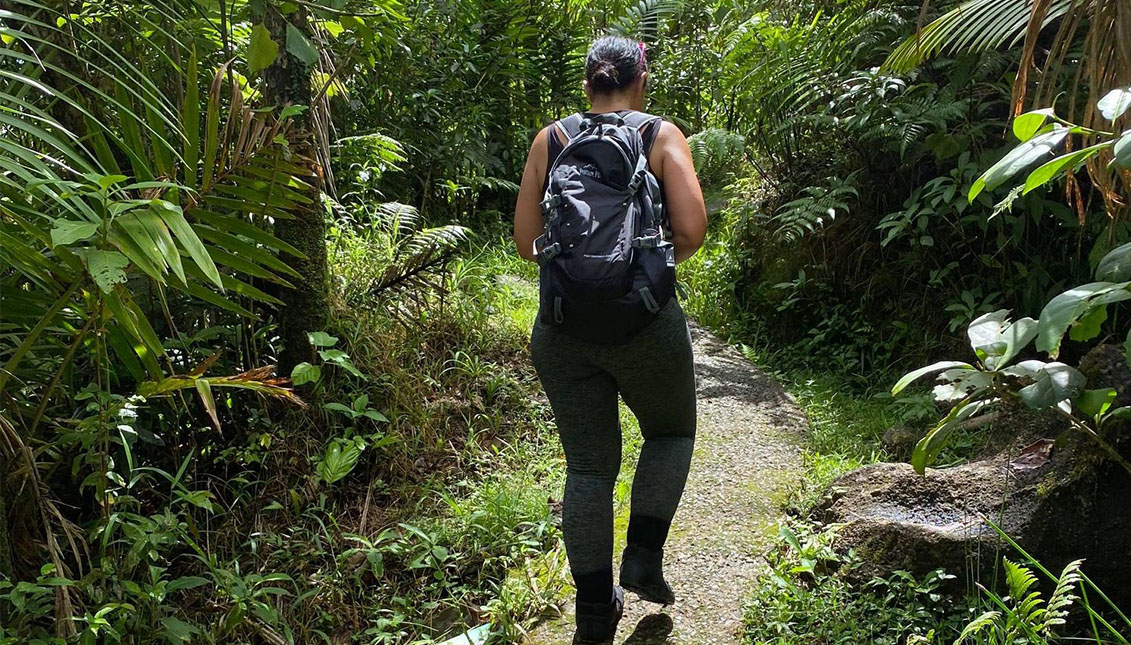
The journey of a Puerto Rican dancer and healer to find her roots
Artist Lynette Ramos explores her cultural heritage through the dance and spirituality of the indigenous people of Puerto Rico in the new self-discovery…
Last October, Lynette Ramos traveled to the island of her ancestors to explore their rich cultural heritage. Her intention, she said, was to "pay homage to them by integrating indigenous forms into our modern times.
Lynette did so alongside her son, Christian, who documented the entire immersion process through videos and photographs. He even recording an interview with a guide from the Center for Ceremonial Indigenous Heritage in Caguana, considered one of the most important archaeological sites in North America.
Having Christian along for the ride made sense, because Ramos, a dancer and shamanic healer, was trying to dig like an archaeologist into her own lineage.
The project, which she presented at a virtual event Tuesday, Dec. 15 at the Julia Burgos Cultural Center for the Arts in Cleveland, is entitled Borikén: Land of the Valiant and the Noble Lord, and encompasses much more than her expedition.
It is part of the artist's long investigation to embrace her past.
Because Lynette is a dancer, Borikén also includes dance. Specifically, it features the Bomba, which has its roots in the history of African slavery in Puerto Rico and at one point in history, was considered an expression of the community and "the people's newspaper."
Ramos, who has always lived in the Tremont neighborhood of Cleveland, Ohio, remembers growing up with the idea that her ancestors were uncivilized. It was only through her travels as an adult that she began to realize that the Taíno people lived in communion with the land and that their culture was very rich.
"They were artists, healers, farmers and fishermen," the dancer and shaman told Cleveland Scene. "They enjoyed the music and the community. They were well organized and thrived on the island."
Nine years ago, Ramos, who has always been a spiritual person, received a degree in "Divinity" from the University of Metaphysical Sciences. Her areas of study ranged from astrology to physical abilities, divination and shadow work (the denied part of ourselves, according to Jungian psychology).
RELATED CONTENT
In 2013, Ramos began traveling throughout Central and South America, participating in sacred plant ceremonies and connecting with her ancestral energy.
"In recent years, I have traveled to some Central and South American countries, as I have a great interest in shamanism, plant medicine, ancient culture and sacred lands," she said. "I wanted to explore my own roots and the land of my ancestors, so that I could share this experience with my community. I wanted to inspire people to do the same, regardless of their ethnic ties. I believe that learning about our history allows us to understand ourselves better and helps us to preserve our traditions and culture."
The Taíno called the island "Borikén," which means "Land of the Brave and the Noble Lord" in their native language.
The indigenous community inhabited Puerto Rico when colonizer Christopher Columbus landed in 1493 and renamed Borikén to San Juan Bautista, claiming it for the Spanish Crown.
For more than four centuries, Puerto Rico was a Spanish colony. Until it became a U.S. territory in 1917.
Ramos was able to conduct her research thanks to a grant from Coyohoga Arts & Culture and received support from her local community to study the Tainos.
At Tuesday's event, she was accompanied by her sister Marisol, a local poet and artist, and by Cleveland Yanilka, whose works explore Afro-Latinx and Taino culture. A short documentary was also presented featuring Lynette's travels to museums and sacred caves.











LEAVE A COMMENT:
Join the discussion! Leave a comment.